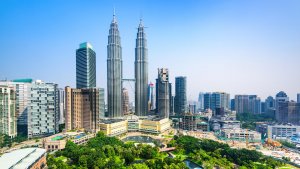South Africa is open for business. As Cyril Ramaphosa steps up, the nation’s longstanding FX prowess can now be unleashed
South Africa’s fine and astute FX market is no longer hampered by capital controls and socialist politics. Now is the time for brokerages to approach its first class Tier 1 banks, its massive and well connected IB network, and continue the path originally formed by pioneering FX brokerages as Cyril Ramaphosa lays down the business friendly future of the Rainbow Nation

Today marks an historic moment in geopolitical events, that being the long awaited resignation of much maligned South African president Jacob Zuma.
Jacob Zuma was elected in 2009, at a time when the global retail OTC electronic trading industry was still in its metamorphic state following the wave of new brokerages that had entered the global market with great ease due to the ready availability of third party platforms such as MetaTrader 4.
The introduction of MetaTrader 4 in 2004 was particularly poignant in the developing world, as London, Sydney and New York were already home to the most established retail FX firms in the world with their own proprietary trading environments, thus the newly empowered smaller firms that emerged in the EMEA region were considerably different in that their marketing-led strategy was the primary focus.
At the time of Mr Zuma’s election, South Africa’s astute financial technology and OTC trading sector grew tremendously, comprising vast retail brokerages such as ACM Gold, which established itself in the upmarket Johannesburg inner suburb of Sandton, and under the leadership of Irfan Pardesi expanded to garner a client base across the entire African continent.
Large introducing broker (IB) networks became prominent, operated by highly educated individuals that brought South African traders with disposable income to invest in overseas asset classes just as the Rand began its turbulent fluctuations, to retail FX brokerages around the world.
South Africa, especially in the urban areas, is by an immeasurable margin the most sophisticated and advanced nation in the entire African continent. Its industry ranges not only from finance, technology and medical science, but also to one of the linchpins of global markets that underpins the finest centers in the world for trading – commodities.
From the diamond mines of Kwazulu Natal to the stock exchange floor in Johannesburg, a raw materials base that is comparable to Macquarie’s efforts in Australia marks South Africa out as a multi-asset nation of extreme wealth and resources, backed up by a highly educated and disciplined workforce.
What has hampered its progress on the world stage thus far has been the extreme socialist aspirations of the government, its inability to secure the value of the local currency, its illiberal business mentality and general wish to curtail the outflow of capital to global markets, despite South Africa’s massive domestic contribution.
With the exodus from power of Jacob Zuma comes Cyril Ramaphosa.
Perhaps Mr Ramaphosa is an unknown quantity in global business circles, however his background is somewhat better aligned with commercial enterprise than his predecessor who did everything he could to disassociate himself and South Africa from the outside world.
One of the most discouraging factors for companies entering emerging markets was historically what is known as ‘expropriation risk’, which is the possibility that a government in a specific country would seize or limit foreign-owned assets or interests. This risk has been widely acknowledged to have subsided completely, however two years ago, Jacob Zuma led the ANC party to consider carrying this out in South Africa.
The warning signs that the outgoing president’s administration would increase its disdain toward foreign investment in South Africa became more evident in February 2015, when President Zuma announced that foreign persons or entities would not be allowed to own landin South Africa, instead being restricted to eligibility for long term leases.
Despite that looming restriction on certain overseas businesses, South Africa is open to its own entities investing abroad. As of 2010, South African companies have been permitted to invest up to R500 million abroad subject to the submission of an application to an Authorised Dealer in the form of the Exchange Control Department of the company’s commercial bank.
However, it was initiatives such as this that prevented the FX giants from investing their efforts into South Africa.
Now with a more business-friendly premier in place, the opportunities are not only relationships with very well recognized banks, but also with high level IBs that have client books consisting of wealthy and educated South Africans wishing to maintain their portfolio abroad, and in our experience, South African traders really want to trade, they are analytical, knowledgeable and will commit their time to it.
South Africa is renowned for having an excellent banking structure, and a very well organized financial markets economy, which dates back to the colonial period, and was, rather like that of Australia, originally based on raw materials and commodities trading.
Jean-Raphael Nahas of FX88 recently expressed his concern over European banks’ sustainability recently, explaining to FinanceFeeds
“The main worry now for European banks is the plunge of interest rates being set to a negative which of course will have effect on the balance sheets. in addition many banks are exposed due to the oil prices. overall this brings great uncertainty to trade bank stocks and there is a way FX companies can benefit this from this change.”
“Forex companies nowadays offer a number of trading instruments and therefore can attract many investors. Investors can benefit ofcourse from the high liquidity round the clock and benefit from the leverage offerings” concluded Mr. Nahas.
By identifying and succeeding in new markets with great opportunities, Mr Nahas is one of the astute business development professionals of the industry.
Mr Nahas has taken brokerages into Africa before, having established Blackwell Global’s operations in Nigeria, and is now looking closely at South Africa.
He concurs with FinanceFeeds perspective that South Africa is renowned for having an excellent banking structure, and a very well organized financial markets economy, which dates back to the colonial period, and was, rather like that of Australia, originally based on raw materials and commodities trading and that it remains one of the only stable areas from which to approach an untapped market in the entire African continent.
Mr Ramaphosa, one of the wealthiest men in Africa with a personal fortune of over $450 million, has had his spell as an anti-business socialist, exemplified by his leadership of the mineworkers unions in the early 1990s, however that was more of a political statement in the advent of regime change than an equivalence of such a trade union firebrand in a free market western country.
Things are very different today, largely because after he resigned as general secretary of the National Union of Mineworkers in 1991, he built a big investment holding company, Shanduka, with interests in sectors ranging from mining to fast foods.
He served on the boards of as many as 100 companies, including MTN, SA Breweries, First Rand Limited, Alexander Forbes, Medscheme and of course Lonmin, where he was implicated in the police action which led to the murder of 34 mineworkers.
As well as Marikana his role in several other companies which he led also reveals a dark side to this “saviour of the country”.
After he left MTN to become South Africa’s deputy president in 2014, he criticised companies which make profits “disappear” by shifting them “to low-tax operations where there is little or no genuine activity”.
Thus, unlike South Africa’s leaders that have been in power since the mid 1990s, Mr Ramaphosa is a genuine, senior level businessman who has built his own commercial empires and is not a political warrior in the way that his post-regime change predecessors have been.
Nearly 60 billion Rand left South Africa illicitly in the 2015-2016 financial year, money that could have been invested in job-creating projects or used to provide free education and the National Health Insurance system.
Mr Ramaphosa’s priorities are clear – to make SA more attractive to investors, through market-friendly policies. His main “solution” is for a “social compact” between government, business and labour, which has already led to those three sectors, under his leadership, agreeing to a minimum wage of R20 an hour.
With capital controls likely to be a thing of the past, and a businessman in charge, South Africa’s combination of technological prowess, financial markets and commodity trading wealth and a willingness of the people to take their own destiny in their hands by trading internationally via retail platforms, this is most certainly a new era, and one that should be embraced by FX brokerages globally.
Image: Sandton, South Africa. Copyright FinanceFeeds









